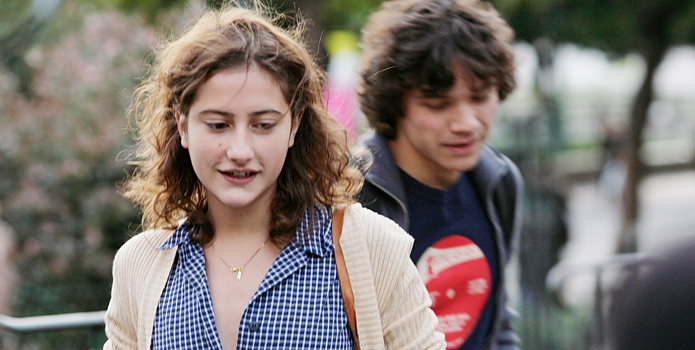And Good Riddance, by David Bax
Your first love tends to be a pretty powerful thing, at least at the time. Never having experienced the consuming rush of infatuation, you feel certain that its arrival marks a sea change and that this can’t be anything but permanent. In almost every case, though, it is not. First loves end. You may pine for them but eventually you move past it and probably even reach a point where you’re glad for both the experience and the demise of it. What if you never recovered from it, though? What kind of teenage love affair would actually have the potency to last a lifetime? And what kind of person never changes enough to outgrow it? These are the questions that could have been explored by Mia Hansen-Løve’s Goodbye First Love. Instead, any potential in the premise is wasted in an overlong and understuffed festival of forced melancholy.
Beginning at the age of fifteen, Camille (Lola Créton) and Sullivan (Sebastian Urzendowsky) are in love. She seems more devoted than he is and his decision to go on a months-long trip to South America with friends leaves her in despair. Before he leaves, they spend a weekend in the country together. The rest of the movie takes place over the next ten years or so of Camille’s life. She goes to school, gets a job and has a boyfriend. Eventually, though, Sullivan returns.
In the early scenes, Camille and Sullivan behave pretty much as you’d expect from people their age. She is needy and pouty. He is impulsive and insensitive. As the film goes on, Camille is revealed as our true lead. This makes it hard to speak to Sullivan’s development into adulthood but, for Camille, these teenage traits don’t go away. Despite forging a respectable career for herself in architecture, she never grows up. Ambling through life in a melancholic haze may hold a certain romance for a fifteen year old but, for a member of adult society, it’s an exhausting and unpleasant trait.
Camille’s gloominess eventually starts to feel like a joke. When her mother asks her when she’s going to get over Sullivan, it’s practically a wink to the audience, who must be wondering the same thing. The gag reaches its apex in one shot where we see Camille at work. She’s plodding morosely around the construction site of a building her firm has designed, acting every bit the sad, little, lost girl she’s been for the entirety of her adult life. And she’s doing so while wearing a big, mandatory hardhat. The juxtaposition of immediate and realistic concerns for safety with her tiresome sturm und drang is so hilarious, you can almost believe it’s intentional.
When at long last the movie ends (perhaps even it got bored with itself), we’ve spent more than two hours with someone about whom we knew all after the first couple scenes. Goodbye First Love had the good idea to ponder the effect of first love as if it were as lasting as it feels. Unfortunately, the film stumbled almost immediately when it forgot to make a case for why the hell these two would even like each other so much in the first place.




























